牛津9A Unit 3 重点词汇解析
牛津英语9A unit3 单元知识解析
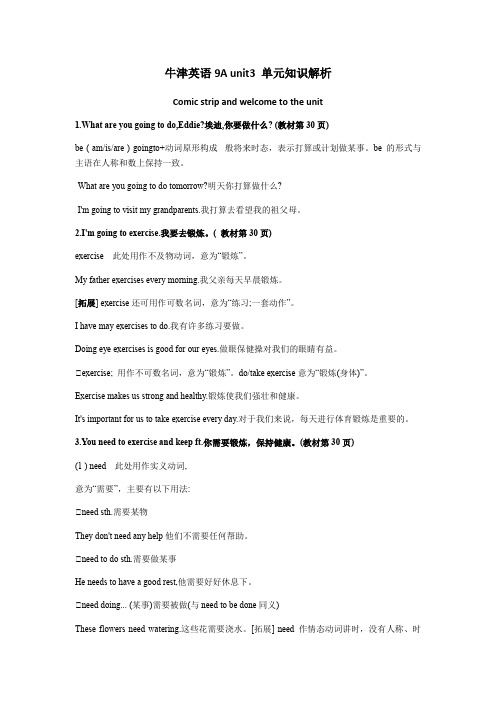
牛津英语9A unit3 单元知识解析Comic strip and welcome to the unit1.What are you going to do,Eddie?埃迪,你要做什么? (教材第30页)be ( am/is/are ) goingto+动词原形构成- 般将来时态,表示打算或计划做某事。
be 的形式与主语在人称和数上保持一致。
-What are you going to do tomorrow?明天你打算做什么?-I'm going to visit my grandparents.我打算去看望我的祖父母。
2.I'm going to exercise.我要去锻炼。
( 教材第30页)exercise 此处用作不及物动词,意为“锻炼”。
My father exercises every morning.我父亲每天早晨锻炼。
[拓展] exercise还可用作可数名词,意为“练习;一套动作”。
I have may exercises to do.我有许多练习要做。
Doing eye exercises is good for our eyes.做眼保健操对我们的眼睛有益。
②exercise; 用作不可数名词,意为“锻炼”。
do/take exercise意为“锻炼(身体)”。
Exercise makes us strong and healthy.锻炼使我们强壮和健康。
It's important for us to take exercise every day.对于我们来说,每天进行体育锻炼是重要的。
3.You need to exercise and keep ft.你需要锻炼,保持健康。
(教材第30页)(1 ) need 此处用作实义动词,意为“需要”,主要有以下用法:①need sth.需要某物They don't need any help他们不需要任何帮助。
牛津译林版英语9A Unit3 Teenage problems知识归纳与拓展

9A Unit3 Teenage problems 【单词拓展】1.deal vi.处理,对付(deal—dealt—dealt)→deal n.大量;很多;交易2.teenage adj.青少年的→teenager n.青少年→teens n.十几岁3.choice n.选择-→choose n.选择,挑选4.awake adj.醒着的--→wake v.醒来唤醒(wake--woke—woken)5.valuable adj.宝贵的;贵重的'→value n.价值;有用;重要→valueless adj.没有价值的;不值钱的6.worry n.担心;担忧的事-→worry v.担心→worrying adj.令人担忧的→worried adj.担忧的7.pronounce vt.发音→pronunciation n.发音,读音8.silence”.安静,寂静;沉默→silent adj.沉默的;寂静的→silently adv.沉默地9.s tress”.精神压力紧张→stressed adj.紧张的,感到有压力的10.suggestion n.建议→suggest vt.建议11.hardly adv.几乎不→hard adv.努力地;辛苦地12.imagine vt.&vi.想象;设想→imagination n.想象力13.worth adj.有……的价值,值得-→worthless adj.没用的;无价值的→worthy adj.值得的14.doubt vt.怀疑-→doubtful adj.不确定的;怀疑的15.solve vt.解决→solution n.解决办法【短语归纳】1,eat less and exercise more少吃多锻炼2.have enough time to do sth有足够的时间做某事3.drive sb mad使某人发狂4.have no choice but to do sth除了做某事以外别无选择5.stay up熬夜6.stay awake保持清醒7.offer sb some suggestions给某人提供一些建议8.develop our hobbies培养我们的爱好9.stay out late在外面待到很晚10.achieve a balance获得平衡11.work out算出;解决12.agree with sb同意某人(的看法)13.solve the problem解决问题14.pay no attention to 不理睬15.seem much happier显得更加高兴16.make progress in在……上取得进步17.be of sb’s age与……同龄【句型分析】1.I dream of a long holiday so that I could have more time for my hobbies.(P36) 句中的so that用来引导目的状语从句,常与may,can,will等连用,意为“为的是”,相当于“in order that”。
牛津版9A Chapter 3章节知识点
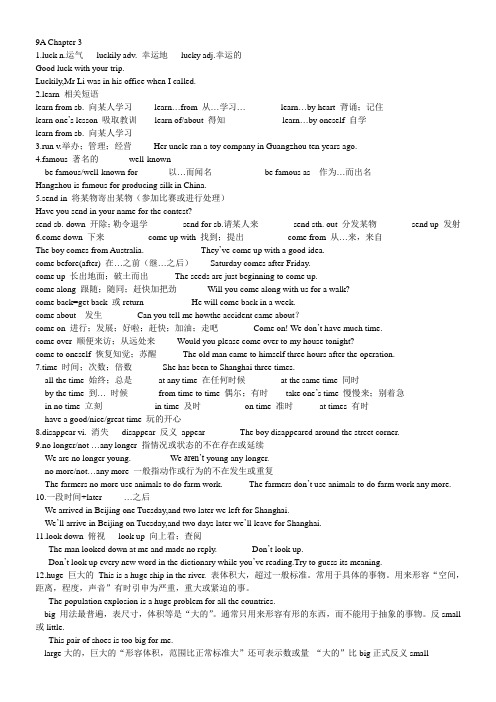
9A Chapter 31.luck n.运气luckily adv. 幸运地lucky adj.幸运的Good luck with your trip.Luckily,Mr Li was in his office when I called.2.learn 相关短语learn from sb. 向某人学习learn…from 从…学习…learn…by heart 背诵;记住learn one‟s lesson 吸取教训learn of/about 得知learn…by oneself 自学learn from sb. 向某人学习3.run v.举办;管理;经营Her uncle ran a toy company in Guangzhou ten years ago.4.famous 著名的well-knownbe famous/well-known for 以…而闻名be famous as 作为…而出名Hangzhou is famous for producing silk in China.5.send in 将某物寄出某物(参加比赛或进行处理)Have you send in your name for the contest?send sb. down 开除;勒令退学send for sb.请某人来send sth. out 分发某物send up 发射e down 下来come up with 找到;提出come from 从…来,来自The boy comes from Australia. They‟ve come up with a good idea.come before(after) 在…之前(继…之后)Saturday comes after Friday.come up 长出地面;破土而出The seeds are just beginning to come up.come along 跟随;随同;赶快加把劲Will you come along with us for a walk?come back=get back 或return He will come back in a week.come about 发生Can you tell me howthe accident came about?come on 进行;发展;好啦;赶快;加油;走吧Come on! We don‟t have much time.come over 顺便来访;从远处来Would you please come over to my house tonight?come to oneself 恢复知觉;苏醒The old man came to himself three hours after the operation.7.time 时间;次数;倍数She has been to Shanghai three times.all the time 始终;总是at any time 在任何时候at the same time 同时by the time 到…时候from time to time 偶尔;有时take one‟s time 慢慢来;别着急in no time 立刻in time 及时on time 准时at times 有时have a good/nice/great time 玩的开心8.disappear vi. 消失disappear 反义appear The boy disappeared around the street corner.9.no longer/not …any longer 指情况或状态的不在存在或延续We are no longer young. We aren‟t young any longer.no more/not…any more 一般指动作或行为的不在发生或重复The farmers no more use animals to do farm work. The farmers don‟t use animals to do farm work any more. 10.一段时间+later …之后We arrived in Beijing one Tuesday,and two later we left for Shanghai.We‟ll arrive in Beijing on Tuesday,and two days later we‟ll leave for Shanghai.11.look down 俯视look up 向上看;查阅The man looked down at me and made no reply. Don‟t look up.Don‟t look up every new word in the dictionary while you‟ve reading.Try to guess its meaning.12.huge 巨大的This is a huge ship in the river. 表体积大,超过一般标准。
牛津9A Unit3知识点归纳难点解析语法复习

牛津9A-Unit3知识点归纳、难点解析、语法复习.Teenage problems 9A Unit 3【短语归纳】变胖 1.get fat 过于担心吃太多/ worry too much2.eat too much3.try more exercise 多加锻炼/ sometimes/at times4.from time to time 时而不时睡得 sleep well5.get enough sleep得到足够的睡眠好 6.feel tired in class在课堂上感到累开着、进行着7.be onmake me mad 8.drive me mad使我发疯≈close no 有亲密的朋友/ have 9.have close friends 没有亲密的朋友friends 感到孤独10.feel lonely 发出许多噪音11.make a lot of noise 整天12.all day exams tests and 有太多的考试13.get too manyquiz ---- test ----- exam (越来越正式)考试14.have enough sleep 有足够的睡眠15.be too noisy at home家里太吵a got ) = have 16.have aproblem(with… .)……问题problem(with…)有(不和家family members 17.no communication with 人交流级级学生18.a Grade 9student一个9 how ….deal with….. 怎样处理2怎样处理what …. do with….. 19. 除了做某事别无其20. have no choice but to do sth他选择呆在外面很晚 stay out late 21. stay up late 熬夜拒绝做某事22. refuse to do sth代词放中间 ( ; 上交hand out分发 23. hand inhand it in)及时按时、准时; in time24. on time 有业余时间25. have spare time向某人提供某物26. offer sbsth/offer sth to s收到某人的来信hear from sb. (瞬间动词)27.= get /receive a letterfrom sb. (瞬间动词)= have aletter from sb.(延续性动词)28. be crazy about对……很着迷29. plenty of 大量,充足≈a lot of30. get into trouble 陷入麻烦/陷入困境31. allow sb to do sth 允许某人做某事 allow doingsth允许做某事32. love of football对足球的喜爱33. be strict with sb对某人严格be strict with sb. in sth.在某事上对某人要求严格34. feel stressed感到有压力的35. sb+spend +时间或金钱…on +sth某人在某事上花费(时间或金钱)36. spend less time on …. 在…上花较少的时间337. achieve a balance between…and …在…..和….之间获得平衡38. succeed in doing sth成功地做某事= be successfulin doing sth.= do sth. successfully39. feel bad about感觉……不好40. make a list of列一个……的清单41. work …out解出…..(代词放中间)42. get/receive low/high marks得到低/高分43. at the moment = at present = now目前44. wish sb to do sth希望某人做某事45. wish to do sth = hope to do sth.希望做某事46. work out算出、解出47. forget about sth忘记有关……的事48. take a bus乘公交车49. get angry生气、发怒50. feel stressed s感到有压力51. advise sb. to do sth.建议某人做某事52. be good for sb. 对某人有益53. be useful to sb对某人有用54. give sb. advice 给某人提建议55. a piece of advice = a suggestion一则建议 twopieces of advice = two suggestions 两则建议56. an hour or two = one or two hours两个小时57. join in some activities 参加一些活动58. revise for tests复习迎考59. share sth. with sb. 和某人分享某物60. have a lot of homework to do 有很多家庭作业做461. tell sb about sth告诉某人有关……的事62. need to do sth需要做某事63. have a test 考试64. solve the problems 解决问题65. turn down the TV/把电视声音开小些 turn up开大些 turn on 开turn off 关66. write to sb给某人写信67. youth workers青少年辅导员68. help sb. out 帮助某人脱离困境69. the top student尖子生70. suffer from sth遭受……之苦71. pay no attention to…不注意/在意…..72. take turns to do …轮流做….73. reply to (my e-mails) 回复(我的电子邮件)74. my last three e-mails 我最近的三封邮件75. not…. any more = no more 不再 not……any longer = no longer 76. Thank sb for doing sth感谢某人做某事77. laugh at sb/sth 嘲笑某人/某物78. ask sb for advice向某人征询意见ask sb for help向某人求助79. shout at sb对某人大喊80. choose to do sth选择做某事81. blame your parents责备你的父母82. be worried about sth/sb为某事/某人而担忧83. keep quiet保持安静84. keep one's worries to oneself把烦恼闷在心里585. take a holiday 休假86. the cause of stress产生压力的原因87. solve the problem解决问题88. feel bad about your weight对体重感到糟糕89. keep fit = keep healthy保持健康90. Why not go walking ? 为什么不去散步呢?Why not go for a walk? Why not take / have a walk?100. have a delicious meal美餐一顿101. be proud of …= take pride in…为…….感到骄傲102. plan your day carefully 精心计划你的每一天【句型归纳及难点解析】1. 青少年问题 teenage problems 青少年的(13—19 岁的)青少年 teen = teenager (13—19 岁的青少年)2.有 have got (英式) = have (美式) and fatter / get get fat /3.变胖变得越来越胖fatterI am getting fatter and 这些天我越来越胖fatter these days… be good at… = do well in4. 擅长于….be weak in…. 在…方面弱…be good for…….有好处对 be useful to …有用对……我知道体育运动对我我擅长英语但我体育较差。
牛津英语9AUnitUnit3单词短语重难点解析
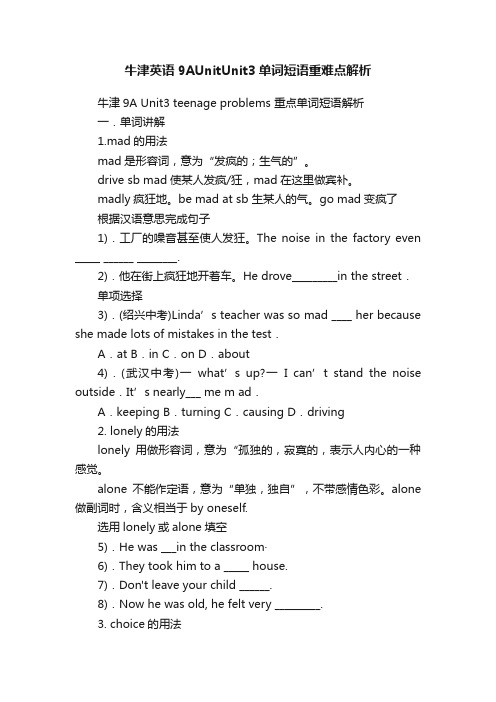
牛津英语9AUnitUnit3单词短语重难点解析牛津9A Unit3 teenage problems 重点单词短语解析一.单词讲解1.mad的用法mad是形容词,意为“发疯的;生气的”。
drive sb mad使某人发疯/狂,mad在这里做宾补。
madly疯狂地。
be mad at sb 生某人的气。
go mad变疯了根据汉语意思完成句子1).工厂的噪音甚至使人发狂。
The noise in the factory even _____ ______ ________.2).他在街上疯狂地开着车。
He drove_________in the street.单项选择3).(绍兴中考)Linda’s teacher was so mad ____ her because she made lots of mistakes in the test.A.at B.in C.on D.about4).(武汉中考)一what’s up?一I c an’t stand the noise outside.It’s nearly___ me m ad.A.keeping B.turning C.causing D.driving2. lonely的用法lonely用做形容词,意为“孤独的,寂寞的,表示人内心的一种感觉。
alone不能作定语,意为“单独,独自”,不带感情色彩。
alone 做副词时,含义相当于by oneself.选用lonely或alone填空5).He was ___in the classroom·6).They took him to a _____ house.7).Don't leave your child ______.8).Now he was old, he felt very _________.3. choice的用法choice是名词,意为“选择,挑选”,have no choice but to…意为“别无选择,只能……”。
牛津英语9AUnitUnit3单词短语重难点解析

牛津9A Unit3 teenage problems 重点单词短语解析一.单词讲解1.mad的用法mad是形容词,意为“发疯的;生气的”。
drive sb mad使某人发疯/狂,mad在这里做宾补。
madly疯狂地。
be mad at sb 生某人的气。
go mad变疯了根据汉语意思完成句子1).工厂的噪音甚至使人发狂。
The noise in the factory even _____ ______ ________.2).他在街上疯狂地开着车。
He drove_________in the street.单项选择3).(绍兴中考)Linda’s teacher was so mad ____ her because she made lots of mistakes in the test.A.at B.in C.on D.about4).(武汉中考)一what’s up?一I can’t stand the noise outside.It’s nearly___ me mad.A.keeping B.turning C.causing D.driving2. lonely的用法lonely用做形容词,意为“孤独的,寂寞的,表示人内心的一种感觉。
alone不能作定语,意为“单独,独自”,不带感情色彩。
alone做副词时,含义相当于by oneself.选用lonely或alone填空5).He was ___in the classroom·6).They took him to a _____ house.7).Don't leave your child ______.8).Now he was old, he felt very _________.3. choice的用法choice是名词,意为“选择,挑选”,have no choice but to…意为“别无选择,只能……”。
牛津9A Unit3重点词语用法归纳

---------------------------------------------------------------最新资料推荐------------------------------------------------------ 牛津9A Unit3重点词语用法归纳reply 和 answer 的区别 reply 既可作不及物动词,又可作及物动词,还可作名词。
作不及物动词,其意为回答,可用reply to(sb. /sth. )表示对作出回答。
作及物动词时,其意为回答,回答说。
作名词时,意思为答道,回信,答复,后面跟介词 to。
She sighed, but didnt reply. 她叹了口气,没有回答。
He failed to reply to my question. 他没能回答我的问题。
What did he do in reply to your challenge?你提出与他较量,他作何反应? 两个词都表示回答的意思。
但是 answer 比较常用,如:question/thedoor-bell/telephone, 而 reply 较正式,经过思考,一一答复问题。
除了后面可跟直接引语或宾语从句以外,一般只用作不及物动词,和连用。
answer 比 reply 常用。
answer 作名词,可译为答案,而 reply 作名词,作答复,回复,不作答案讲。
answer 是及物动词,而 reply 可以是及物动词,也可以是1 / 7不及物动词。
例如:The reply is not an answer. 这回答不中肯。
She did not know what to reply. 她不知道该回答什么才好。
He replied that he knew nothing about the accident. 他回答说关于那个事故他什么都不知道。
The teacher replied to me/ my question patiently. 老师耐心地回答了我的问题。
牛津9A Unit3知识点
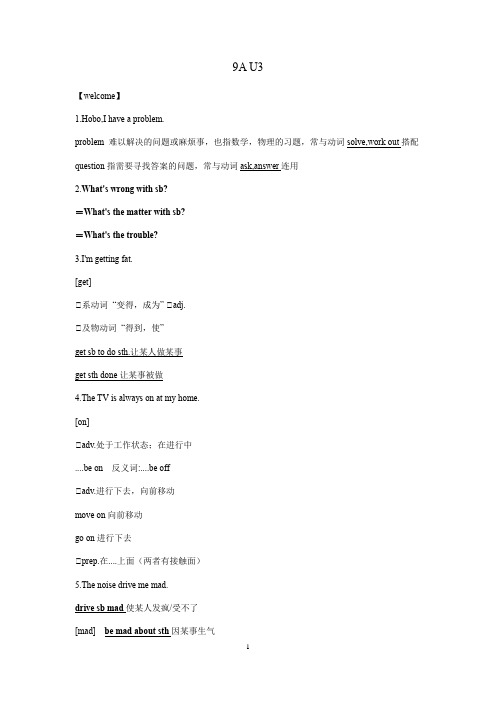
9A U3【welcome】1.Hobo,I have a problem.problem 难以解决的问题或麻烦事,也指数学,物理的习题,常与动词solve,work out搭配question指需要寻找答案的问题,常与动词ask,answer连用2.What's wrong with sb?=What's the matter with sb?=What's the trouble?3.I'm getting fat.[get]①系动词“变得,成为” ①adj.①及物动词“得到,使”get sb to do sth.让某人做某事get sth done让某事被做4.The TV is always on at my home.[on]①adv.处于工作状态;在进行中....be on 反义词:....be off①adv.进行下去,向前移动move on向前移动go on进行下去①prep.在....上面(两者有接触面)5.The noise drive me mad.drive sb mad使某人发疯/受不了[mad] be mad about sth因某事生气be mad at/with sb生某人的气6. sometime 用when提问some time 用how long提问sometimes 用how often提问some times 用how many times提问7.8.get low/high marks得低/高分9.take /do an exam参加考试pass an exam通过考试fail an exam考试不及格10.Perhaps you should manange your time better.[manage]①动词“合理安排,有效使用(金钱、时间等)”manage your time better更好地合理安排你的时间①动词“设法做到” manage to do sth设法做成某事,努力完成某事①动词“控制,管理” 名词:manager 经理,管理者【reading】1.I don't know how I should deal with it.处理,应付deal with和how连用do with和what连用2.I have no choice but to do it.[choice]①不可数名词“选择权,选择的可能性”have no choice but to do sth别无选择只能做某事①可数名词“选择” 动词:chosechose to do sth=make a choice to do sth选择做某事[but]连词①除...之外I have no choice but to leave.►but前无实义动词do/does/did时,but后的不定式要带to Last night I did nothing but watch TV.►but前有实义动词do/does/did时,but后的不定式省略tobut 除...之外;只有but后的词是仅有或存在的内容,通常与no,nothing,nobody等表示否定的词(组)连用except 除…之外(不再有)指从整体排除expect后的人或物,常与all,everybody,everything等词连用besides除…之外(还有)是指在原来的基础上加上besides后的人或物but/except besides②“但是”,表示转折3.stay up熬夜4.Then I sometimes find it hard to stay awake the next day.awake & wakeawakeadj.醒着的be awake醒着vt/vi醒来;唤醒awake sb唤醒某人5.I know it is important to finish all my homework on tome.[time]构成的短语all the time一直from time ti time偶尔,有时at times有时,偶尔at all times随时,总是at a time每次,逐一at the same time同时6.However,I hardly have any spare time for my hobbies like volleyball ans music.[hardly] adv.几乎不➢相当于almost not➢位于连系动词,be动词,助动词或情态动词之后➢实义动词之前➢hardly 为否定副词,出现在反义疑问句中时,后面的附加疑问部分要用肯定式。
03最新牛津译林版 9A Unit 3 Teenage problems知识点讲解
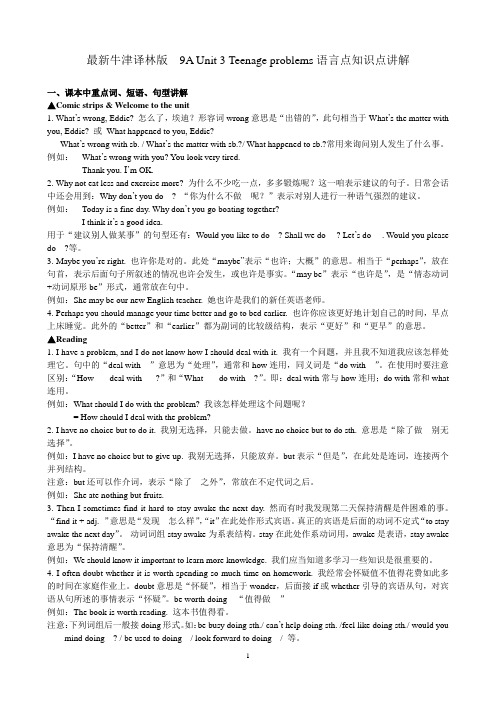
最新牛津译林版9A Unit 3 Teenage problems语言点知识点讲解一、课本中重点词、短语、句型讲解▲Comic strips & Welcome to the unit1. What’s wrong, Eddie? 怎么了,埃迪?形容词wrong意思是“出错的”,此句相当于What’s the matter with you, Eddie? 或What happened to you, Eddie?What’s wrong with sb. / What’s the matter with sb.?/ What happened to sb.?常用来询问别人发生了什么事。
例如:---What’s wrong with you? You look very tired.---Thank you. I’m OK.2. Why not eat less and exercise more? 为什么不少吃一点,多多锻炼呢?这一咱表示建议的句子。
日常会话中还会用到:Why don’t you do---? “你为什么不做---呢?”表示对别人进行一种语气强烈的建议。
例如:---Today is a fine day. Why don’t you go boating together?---I think it’s a good idea.用于“建议别人做某事”的句型还有:Would you like to do---? Shall we do ---? Let’s do ---. Would you please do---?等。
3. Maybe you’re right. 也许你是对的。
此处“maybe”表示“也许;大概”的意思。
相当于“perhaps”,放在句首,表示后面句子所叙述的情况也许会发生,或也许是事实。
“may be”表示“也许是”,是“情态动词+动词原形be”形式,通常放在句中。
牛津初中英语9A-Unit3知识点归纳

牛津初中英语9A Unit3知识点归纳重点短语Welcome to the uniteat too much/worry too much吃得太多/担心太多get enough sleep 得到足够的睡眠be on (灯、电视等)开着、亮着too many tests 太多的测试close friends 亲密的朋友drive sb mad = make sb mad 把某人逼(go mad发疯)have no communication with sb 与某人没有交流Readinghow … deal with…=what… do with…怎样处理…….. have no choice but to do sth 除了做某事别无选择stay up late 熬夜complete/finish the exercises 完成这些练习(指笔头l 练习)refuse to do sth 拒绝做某事hand it/them in= turn in 上交(代词放中间)hand out 分发(代词放中间)feel bad about…对….感到糟糕be (well) worth doing sth (很)值得做某事on time 按时;准时in time 及时have some spare/free time 有空余时间offer sb. sth. = offer sth. to sb. 为某人提供某物provide sb with sth = provide sth for sb为某人提供某物offer sb some suggestions/ adviceoffer to do sth 主动提出做某事be of great value(n.)to sb = be very valuable to sb 对某人来说有很大价值hear from sb.(短) = get/receive a letter from sb.(短)=have a letter from sb.(延)收到某人来信be crazy about…对…..很着迷my love of football 我对足球的热爱plenty of = lots of/a lot of 大量的,充足的(后接可数/不可数名词)stay out late 呆在外面很迟get into trouble 陷入困境allow doing / allow sb to do sth 允许做某事/允许某人做某事be stric t with sb. 对某人要求严格be strict in sth. 对某事要求严格wish (sb) to do sth 希望(某人)做某事advise sb to do sth 建议某人做某事advise doing sth建议做某事achieve/keep a balance between…获得/保持…之间的平衡succeed in doing sth= be successful in doing sth成功地做某事make a list of…列一个…..清单work …..out解出,制定出…..(代词放中间)take /follow one's advice 接受/采纳某人的建议a piece of advice 一条建议(建议不可数)agree with sb 同意某人(的意见)give sth. up放弃某事(代词放中间)give up doing sth.放弃做某事forget about sth.忘记有关…的事an hour or two 一两个小时Vocabulary and Grammarget/receive low/high marks得到低/高分at the moment = at present = now目前Revise(= go over) for tests 复习迎考there is no need to do sth 没有必要做某事have no courage to do sth 没有勇气做某事to tell you the truth(n.)实话告诉你quarrel with sb about sth 与某人争吵某事spare some time for sb = spare sb some time 为某人匀出时间turn down/up 调低/高音量make progress 取得进步solve the problems 解决问题youth workers 青少年辅导员valuable suggestions 有价值的建议Integrated Skills and Study skillslaugh at sb 嘲笑某人pay no attention to sb 不注意某人be proud of …= take pride in…为…….感到骄傲reply to (my e-mails) = answer (my e-mails)回复,回答(我的电子邮件)suffer from….遭受…..痛苦;患病ask sb for advice 向某人征询意见make enough time for…为……腾出足够的时间Main task and Checkoutblame sb for sth 因某事而责备某人cause of stress 产生压力的原因of one’s age 与某人同年龄的one main cause of stress压力的一个主要原因keep your worries to yourself 把担忧留给自己====Word 行业资料分享--可编辑版本--双击可删====源-于-网-络-收-集重点句子后无to,无do 有to) (或do 的某种形式)I didn't nothing but wait9. We like staying out late to play football. 我们喜欢待在外面踢足球到很晚10. They can help us relax and make our lives more interesting 这能帮助我们放松并使我们的生活更加有趣11. I wish I could have my parents' support 我希望我得到父母的支持 (wish 引导的宾语从句用虚拟语气)13.It seems that you spend a lot of time playing football.= You seem to spend a lot of time playing football.17. I really don’t know which to do first. 我真不知道先做哪一个.你能告诉我和谁去谈、去哪里求助吗?谢谢你聆听我的问题并给我提出建议.。
牛津9A Unit 3 重点词汇解析
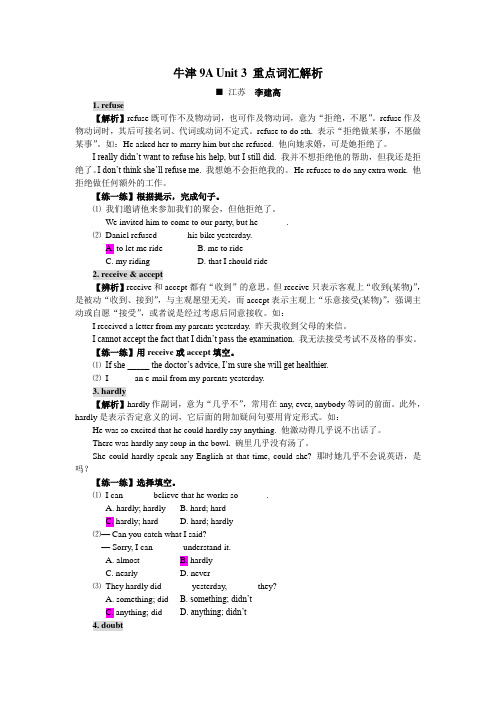
牛津9A Unit 3 重点词汇解析■江苏李建高1. refuse【解析】refuse既可作不及物动词,也可作及物动词,意为“拒绝,不愿”。
refuse作及物动词时,其后可接名词、代词或动词不定式。
refuse to do sth. 表示“拒绝做某事,不愿做某事”。
如:He asked her to marry him but she refused. 他向她求婚,可是她拒绝了。
I really didn’t want to refuse his help, but I still did. 我并不想拒绝他的帮助,但我还是拒绝了。
I don’t think she’ll refuse me. 我想她不会拒绝我的。
He refuses to do any extra work. 他拒绝做任何额外的工作。
【练一练】根据提示,完成句子。
⑴我们邀请他来参加我们的聚会,但他拒绝了。
We invited him to come to our party, but he ______.⑵Daniel refused ______ his bike yesterday.A. to let me rideB. me to rideC. my ridingD. that I should ride2. receive & accept【辨析】receive和accept都有“收到”的意思。
但receive只表示客观上“收到(某物)”,是被动“收到、接到”,与主观愿望无关,而accept表示主观上“乐意接受(某物)”,强调主动或自愿“接受”,或者说是经过考虑后同意接收。
如:I received a letter from my parents yesterday. 昨天我收到父母的来信。
I cannot accept the fact that I didn’t pass the examination. 我无法接受考试不及格的事实。
牛津英语9A Unit3单词讲解
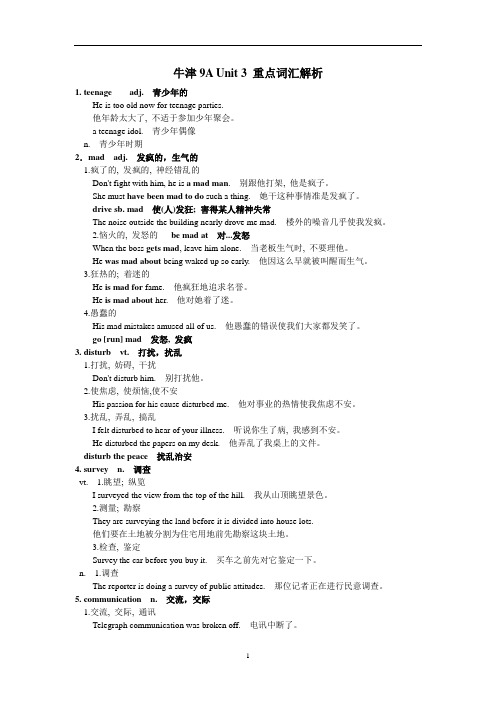
牛津9A Unit 3 重点词汇解析1. teenage adj. 青少年的He is too old now for teenage parties.他年龄太大了, 不适于参加少年聚会。
a teenage idol. 青少年偶像n. 青少年时期2.mad adj. 发疯的,生气的1.疯了的, 发疯的, 神经错乱的Don't fight with him, he is a mad man. 别跟他打架, 他是疯子。
She must have been mad to do such a thing. 她干这种事情准是发疯了。
drive sb. mad 使(人)发狂; 害得某人精神失常The noise outside the building nearly drove me mad. 楼外的噪音几乎使我发疯。
2.恼火的, 发怒的be mad at 对...发怒When the boss gets mad, leave him alone. 当老板生气时, 不要理他。
He was mad about being waked up so early. 他因这么早就被叫醒而生气。
3.狂热的; 着迷的He is mad for fame. 他疯狂地追求名誉。
He is mad about her. 他对她着了迷。
4.愚蠢的His mad mistakes amused all of us. 他愚蠢的错误使我们大家都发笑了。
go [run] mad 发怒, 发疯3. disturb vt. 打扰,扰乱1.打扰, 妨碍, 干扰Don't disturb him. 别打扰他。
2.使焦虑, 使烦恼,使不安His passion for his cause disturbed me. 他对事业的热情使我焦虑不安。
3.扰乱, 弄乱, 搞乱I felt disturbed to hear of your illness. 听说你生了病, 我感到不安。
牛津译林版英语9A Unit3 单元知识解析
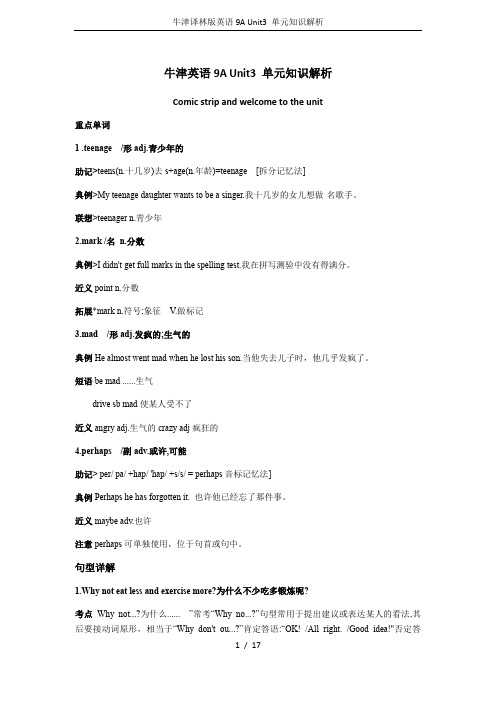
牛津英语9A Unit3 单元知识解析Comic strip and welcome to the unit重点单词1 .teenage /形adj.青少年的助记>teens(n.十几岁)去s+age(n.年龄)=teenage [拆分记忆法]典例>My teenage daughter wants to be a singer.我十几岁的女儿想做-名歌手。
联想>teenager n.青少年2.mark /名n.分数典例>I didn't get full marks in the spelling test.我在拼写测验中没有得满分。
近义point n.分数拓展*mark n.符号;象征V.做标记3.mad /形adj.发疯的;生气的典例He almost went mad when he lost his son.当他失去儿子时,他几乎发疯了。
短语be mad ......生气drive sb mad使某人受不了近义angry adj.生气的crazy adj疯狂的4.perhaps /副adv.或许,可能助记> per/ pa/ +hap/ 'hap/ +s/s/ = perhaps音标记忆法]典例Perhaps he has forgotten it. 也许他已经忘了那件事。
近义maybe adv.也许注意perhaps可单独使用,位于句首或句中。
句型详解1.Why not eat less and exercise more?为什么不少吃多锻炼呢?考点Why not...?为什么...... ”常考“Why no...?”句型常用于提出建议或表达某人的看法,其后要接动词原形,相当于“Why don't ou...?”肯定答语:“OK! /All right. /Good idea!"否定答语:“Sorry, .../I'm afraid not.”★Why not go for a picnic? = Why don't you go for a picnic?为什么不去野餐呢?★-Why not go swimming为什么今天下午不去游泳呢?-Good idea! /Sorry, I'm busy this afternoon. 好主意! /对不起,我今天下午很忙。
牛津译林版英语9A-Unit-3-知识点总结解析
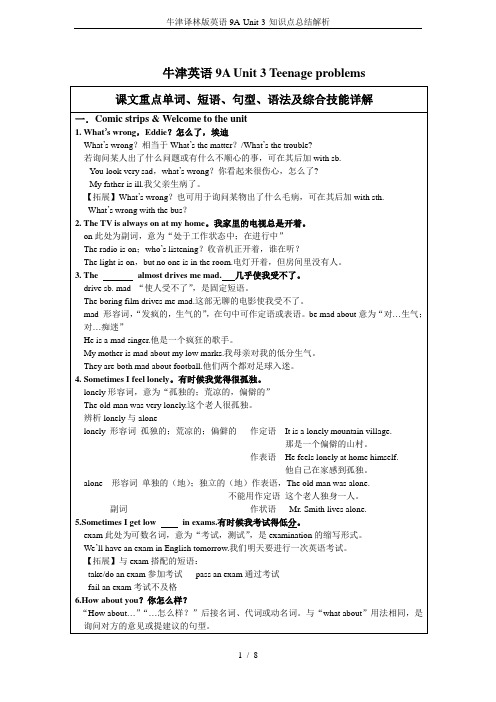
--You look very sad,what’s wrong?你看起来很伤心,怎么了?
--My father is ill.我父亲生病了。
【拓展】What’s wrong?也可用于询问某物出了什么毛病,可在其后加with sth.
We all went to the cinema except Tom. He was ill.除了汤姆,我们都去看电影了。他生病了。
Amy has another two good friends besides you.除了你之外,诶米还有两个好朋友。
3.I often have to stay up late。我经常不得不熬夜到很晚。
hardly副词,意为“几乎不”,相当于almost not,用于连系动词、助动词或情态动词之后,实义动词之前。
I hardly ate anything last night.我昨天晚上几乎什么也没吃。
This year’s exam was much harder than last year’s.今年的测试比去年的难得多。
What did you do with your old bike?你怎么处理得你的旧自行车?
2….I have no choice but to do it。…我别无选择,只能去做。
have no choice but to do sth.意为“别无选择,只能去做某事”
She has no choice but to study hard.她别无选择,只能努力学习。
except除…之外(不再有)指从整体排除except后的人或物,常与all,everybody,everything等连用
广州地区沪教牛津版九年级上册9AUnit3Familylifeincities知识点、重点解析
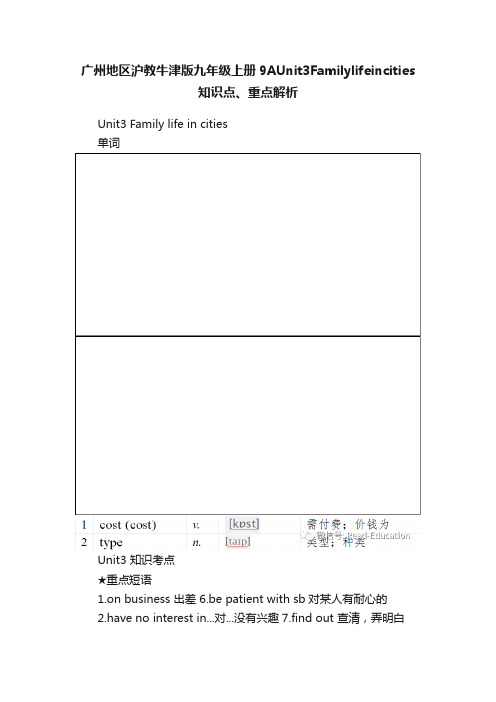
广州地区沪教牛津版九年级上册9AUnit3Familylifeincities知识点、重点解析Unit3 Family life in cities单词Unit3 知识考点★重点短语1.on business 出差 6.be patient with sb对某人有耐心的2.have no interest in...对...没有兴趣7.find out 查清,弄明白3.out of dat=out of fashion过时的municate with sb和某人交流4.for example=such as例如9.have to do sth必须做某事5.give sb a hand=help sb帮助某人10.except sb to do sth指望某人做某事★Reading精讲1.It's much bigger than our last one.这比我们最后一个还大得多。
much 可修饰比较级,类似的词还有a little, a bit, far,even等。
练一练:That story is ___ than this one.A.much interestingB.more much interestingC.much more interestingD.the most interesting2.I feel lonely when my parents are away from home.当我的父母远离家乡的时候,我感到孤独。
辨析:lonely; alone 孤独;单独lonely 主观上的孤独,寂寞alone 客观上的单独,独自一人I was alone in the classroom, but I didn't feel lonely. 我一个人待在教室里,但我并不感到孤独。
3.New fashions soon go out of date, don't they?新潮流永远不会过时,不是吗?out of date 过时date n. 日期;年代; 约会v. 注日期;约会;始于What's the date today?今天是几月几日?I have a date with him next Sunday.我跟他下周日有约。
新版牛津9A Unit3 Teenage problems 单元复习归纳

9A Unit 3 Teenage problems 单元复习归纳一、重点词汇单词teenage adj.青少年的mark n.分数;标记mad adj.疯狂的;生气的exam n.(=examination)考试,测试perhaps adv.或许,可能deal vi.处理choice m选择but prep.除……外;只有awake adj.醒着的hardly adv.几乎不doubt vt.怀疑worth adj.值得,值……钱imagine vt.&vi.想象,设想suggestion n.建议cause n.原因strict adj.严格的,严厉的valuable adj.宝贵的,很有用的;贵重的list n.清单whom pron. 谁(宾格)silence n.安静,寂静;沉默worry n.担心;令人担忧的事dictionary n.字典bookworm n.书虫,书呆子schoolwork n.课业progress n.进展,进步aloud adv.大声地;出声地pronounce vt,发音correctly adv.正确地pronunciation n.发音mention vt.提及;说起stress n.精神压力,紧张unhappy adj.不快乐的,不满的词组1.too much太多2.in class在课上3.drive sb mad使某人疯狂4.feel lonely感到孤独5.all day整天6.feel sleepy瞌睡的7.deal with处置;处理8.have no choice but to…没有选择只能……9.stay up熬夜10. hand in上交11. feel bad about sth对……感到难过12. be worth doing值得做某事13. dream of/about梦想;想象14. hear from收到某人的来信15. be crazy about对……感到疯狂16. worry about担心17. get into trouble陷入麻烦18. be strict with sb对某人要求严格19. stay out待在户外;(晚上)不回家20. look forward to渴望21. make sure确保;确认22. in one's mind在某人的想法中23. make a list of列出24. work out算出;解决25. according to根据26. agree with同意27. instead of代替;而不28. youth worker青少年辅导员29. on show上演30. end with结束31. laugh at嘲笑32. go over复习;回顾33. don't mention it不客气34. keep sth to oneself秘而不宣35. be of sb's age与……同龄的二、重要句型1.I have a problem, but I wonder how I should deal with it.我有一个问题,但是我想要知道我应该怎样处理它。
上海牛津版9A U3 知识点总结

一、单词精讲1.opinion//n.想法,看法,意见词组:inone’sopinion__________________2.responsibility//n.责任拓展:adj.____________________beresponsiblefor……对……负责e.g.Thehouseisamess.这个房间又脏又乱。
拓展:amessof一大堆…;把…弄糟inamess乱糟糟,一团糟e.g.I'vemadesuchamessofmylife.Therearemanyreasonswhytheeconomyisinsuchamess.7.extremely//adv.极其,非常拓展:extremeadj.极端的,偏激的n.极端,极其偏激的事物8.unhappy//adj.不快乐的,悲伤的拓展:反义词:____________________副词:______________________happinessn._________________否定前缀un,加在名词,形容词,副词之前如:unfinished(未完成的);undoubted(无疑的);unhappy(不快乐不不becertainofdoingsthbecertainthat/if/whetherOurteamiscertainofwinning.I’mcertainthatit’snotyourfault.13.goldfish//n.金鱼合成词:n.+n.=n.举例:________________________________________________14.apologize//v.道歉搭配:apologizefor________________apologizetosb.词转:n.__________________Makeanapologyforsth.因某事而道歉15.review//n.(书刊、电影等的)评论;v.回顾,检查二、Phrases词组9.payfor为……付钱e.g.Ihavetopay150dollarsforthesewingmachine.其他表示“花费”的词(1)spend的主语通常是人,往往用于以下句型:(sb)spendsomemoney/sometimeonsth.(sb)spendsomemoney/sometime(in)doingsth.e.g.Ispentfiftyyuanonthecoat=Ispentfiftyyuan(in)buyingthecoat.(2)take常用于“占用、花费”时间,其主语通常为形式主语“it”或物。
牛津9AU3知识点
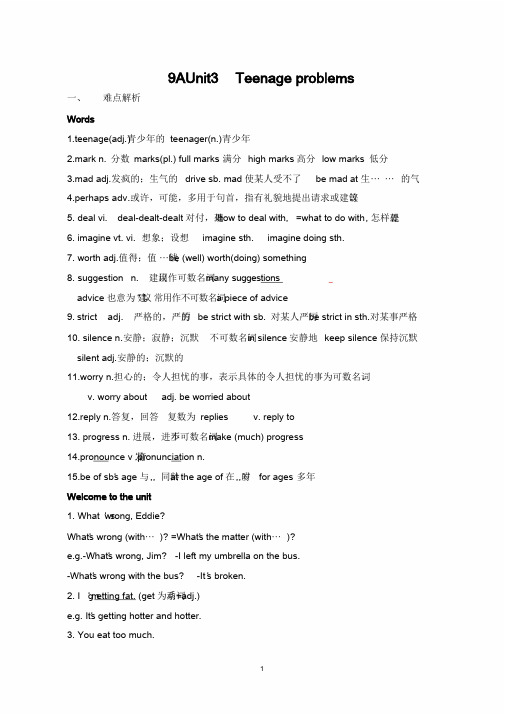
9AUnit3 Teenage problems一、难点解析Words1.teenage(adj.青)少年的teenager(n.)青少年2.mark n. 分数marks(pl.) full marks 满分high marks 高分low marks 低分3.mad adj.发疯的;生气的drive sb. mad使某人受不了be mad at生⋯⋯的气4.perhaps adv.或许,可能,多用于句首,指有礼貌地提出请求或建议等。
5. deal vi. deal-dealt-dealt对付,处理how to deal with, =what to do with ,怎样处理,,6. imagine vt. vi. 想象;设想imagine sth. imagine doing sth.7. worth adj.值得;值⋯钱b e (well) worth(doing) something8. suggestion n. 建议用作可数名词m any suggestionsadvice也意为“建议”,常用作不可数名词a piece of advice9. strict adj. 严格的,严厉的be strict with sb. 对某人严厉b e strict in sth.对某事严格10. silence n.安静;寂静;沉默不可数名词i n silence 安静地keep silence保持沉默silent adj.安静的;沉默的11.worry n.担心的;令人担忧的事,表示具体的令人担忧的事为可数名词。
v. worry about adj. be worried about12.reply n.答复,回答复数为replies v. reply to13. progress n. 进展,进步不可数名词m ake (much) progress14.pronounce v发.音p ronunciation n.15.be of sb’s age与,, 同龄a t the age of在,,岁时for ages 多年Welcome to the unit1. What ’w s rong, Eddie?What’s wrong (with⋯)? =What’s the matter (with⋯)?e.g.-What’s wrong, Jim? -I left my umbrella on the bus.-What’s wrong with the bus? -It ’s broken.2. I ’g m etting fat. (get为系动词+adj.)e.g. It’s getting hotter and hotter.3. You eat too much.too much 太多,修饰不可数名词too many 太多,修饰可数名词much too 太,, ,修饰形容词4. Why not eat less and exercise (v.) more?可数名词,意为“操;习题”do morning/eye exercises” e.g. You can try your best and enjoy the exercise.炼不可数名词,意为“锻5. The TV is always on at my home. be on(adv.)意为“开着的”e.g. Don’t leave the lights on.副词on 构成的短语还有turn on; move on; put on6. The noise almost drives me mad.noise n. noisy adj. noisier noisily adv. more noisily固定结构drive/make sb. mad (drive-drove-driven)Reading1.I do not know how I should deal with it. 我不知道我该如何处理它。
- 1、下载文档前请自行甄别文档内容的完整性,平台不提供额外的编辑、内容补充、找答案等附加服务。
- 2、"仅部分预览"的文档,不可在线预览部分如存在完整性等问题,可反馈申请退款(可完整预览的文档不适用该条件!)。
- 3、如文档侵犯您的权益,请联系客服反馈,我们会尽快为您处理(人工客服工作时间:9:00-18:30)。
牛津9A Unit 3 重点词汇解析■江苏李建高1. refuse【解析】refuse既可作不及物动词,也可作及物动词,意为“拒绝,不愿”。
refuse作及物动词时,其后可接名词、代词或动词不定式。
refuse to do sth. 表示“拒绝做某事,不愿做某事”。
如:He asked her to marry him but she refused. 他向她求婚,可是她拒绝了。
I really didn’t want to refuse his help, but I still did. 我并不想拒绝他的帮助,但我还是拒绝了。
I don’t think she’ll refuse me. 我想她不会拒绝我的。
He refuses to do any extra work. 他拒绝做任何额外的工作。
【练一练】根据提示,完成句子。
⑴我们邀请他来参加我们的聚会,但他拒绝了。
We invited him to come to our party, but he ______.⑵Daniel refused ______ his bike yesterday.A. to let me rideB. me to rideC. my ridingD. that I should ride2. receive & accept【辨析】receive和accept都有“收到”的意思。
但receive只表示客观上“收到(某物)”,是被动“收到、接到”,与主观愿望无关,而accept表示主观上“乐意接受(某物)”,强调主动或自愿“接受”,或者说是经过考虑后同意接收。
如:I received a letter from my parents yesterday. 昨天我收到父母的来信。
I cannot accept the fact that I didn’t pass the examination. 我无法接受考试不及格的事实。
【练一练】用receive或accept填空。
⑴If she _____ the doctor’s advice, I’m sure she will get healthier.⑵I _____ an e-mail from my parents yesterday.3. hardly【解析】hardly作副词,意为“几乎不”,常用在any, ever, anybody等词的前面。
此外,hardly是表示否定意义的词,它后面的附加疑问句要用肯定形式。
如:He was so excited that he could hardly say anything. 他激动得几乎说不出话了。
There was hardly any soup in the bowl. 碗里几乎没有汤了。
She could hardly speak any English at that time, could she? 那时她几乎不会说英语,是吗?【练一练】选择填空。
⑴I can ______ believe that he works so ______.A. hardly; hardlyB. hard; hardC. hardly; hardD. hard; hardly⑵— Can you catch what I said?— Sorry, I can ______ understand it.A. almostB. hardlyC. nearlyD. never⑶They hardly did ______ yesterday, ______ they?A. something; didB. something; didn’tC. anything; didD. anything; didn’t4. doubt【解析】doubt作动词或名词,意为“怀疑,不相信”。
doubt作动词,通常含有否定意味,还表示“没有把握,拿不准”,其宾语可以是名词、代词或名词性从句。
值得注意的是,主句为肯定句时,doubt后的从句用whether或if引导;主句为否定句或疑问句时,doubt 后的从句用that引导。
如:You can ask him if you doubt my words. 如果你怀疑我说的话,你可以去问他。
How could you ever doubt me? 怎么你从来不信任我?We all doubt whether / if he can do the job well. 我们都怀疑他是否能把这项工作做好。
I don’t doubt that he will accept the money at once. 我毫不怀疑他会立刻接受那些钱。
Do you doubt that they will win the game? 你对他们会赢得比赛有所怀疑吗?Please dismiss all doubts about it. 请打消对此的一切顾虑。
【练一练】选择填空。
⑴—The meeting has begun and ______ he will come.—Of course. He is sure to come. He’ll speak at the meeting.A. I believeB. I hopeC. I thinkD. I doubt if⑵There is no doubt ______ he is guilty.A. whetherB. ifC. whenD. that5. worth【解析】worth作形容词,意为“值得……;价值……”,只能作表语,但不可单独作表语,后面必须跟名词、代词、v.-ing形式或what引导的从句等。
be (well) worth doing sth. 表示“(很,非常)值得做某事”;be worth it表示“有意义;有作用”。
如:The party was successful, and worth the hard work. 晚会成功了,努力没有白费。
What is the pen worth? = How much is the pen worth? 钢笔值多少钱?It isn’t worth what you paid for that. 那个你买贵了。
The novel is well worth reading. 这部小说非常值得一读。
It was hard work, but it was worth it. 虽然这是繁重的活儿,但是有意义。
【知识链接】worth还可作名词,意为“价值”。
(be) of worth表示“有价值的,值钱的”;还有be of little worth, be of no worth“不值钱的,无价值的”等。
如:I know his worth. 我了解他这个人的价值。
A college education will be of great worth to you later. 在大学受的教育对你今后会大有帮助。
【练一练】选择填空。
⑴—Do you think the report was worth ______?—Yes, I think so.A. listeningB. listening toC. to listenD. to listen to⑵The book is not ______ what we paid.A. worthB. valueC. costD. expensive⑶I don’t think that your watch is ______.A. worthy of the priceB. worth of the priceC. worth the priceD. worthy to buy⑷I won’t pay $50 for the bag; it’s not worth ______.A. that allB. all that muchC. much all thatD. that much all6. allow【解析】allow作及物动词,意为“允许,许可”,常见用法有:⑴allow sb. to do sth. 表示“允许某人做某事”;⑵当allow后面没有代词作宾语时,要用allow doing sth. 结构,意为“允许做某事”;⑶be allowed to do sth. 表示“被允许做某事”,其中不定式不能改为v.-ing 形式;⑷allow后可接双宾语。
如:Please allow me to introduce my good friend to you. 请允许我把我的好朋友介绍给你。
We don’t allow cheating i n exams. 我们不允许考试作弊。
Girls are not allowed out at night alone. 女孩在晚上不许单独外出。
Please allow me a few more minutes. 请再多给我几分钟。
【练一练】根据汉语提示,完成句子。
⑴妈妈允许我买本故事书。
Mother ______ ______ ______ ______ a story book.⑵我们不允许在医院吸烟。
We ______ ______ ______ in the hospital.⑶在课堂上大声喧哗是不被允许的。
We ______ ______ ______ ______ loudly in class.7. notice【解析】notice作动词,意为“注意,察觉”。
notice sb. do / doing sth. 表示“注意到某人做了某事/正在做某事”,notice后面还可以跟宾语从句。
如:Did you notice her hair? It was long and straight. 你注意到她的头发了吗?它长而且直。
— What did the young man look like? 那个年轻人长什么模样?—I’m sorry I didn’t notice. 对不起,我没有留神到。
I noticed him enter the office. 我看到他进了办公室。
I noticed the man running to the car. 我看到那个男的正在向车跑去。
I noticed that he was wearing a blue shirt that day. 我注意到那天他穿着一件蓝色的衬衫。
【知识链接】notice还可作名词,意为“注意;布告,通知”。
take notice of sb. / sth. 表示“注意某人/某物”。
